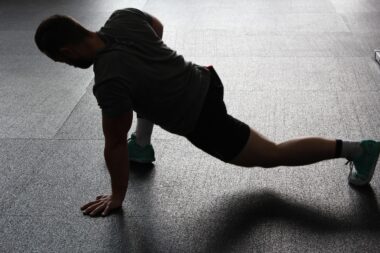How to Manage Competition Stress for Weightlifting Athletes
Stress management is critical for weightlifting athletes, particularly during competitions. Athletes often face intense pressure to perform well, which can lead to anxiety and stress. To combat this, it’s essential to establish a pre-competition routine that includes mental preparation and physical conditioning. This routine should incorporate visualization techniques. Athletes can visualize themselves succeeding, completing lifts, and achieving personal bests, helping to build confidence. Furthermore, setting realistic goals can reduce pressure. Instead of focusing on winning, athletes can concentrate on improving their personal records or executing perfect technique. Additionally, engaging in mindfulness practices can help athletes stay present and focused. Techniques such as deep breathing and meditation can significantly lower anxiety levels prior to competition, allowing for better focus during lifts. Finally, seeking support from coaches can make a significant difference. Coaches can provide reassurance, guidance, and constructive feedback, which can help athletes feel more secure about their performance. By combining these strategies, weightlifting athletes can effectively manage competition stress and enhance their overall performance. Consistently applying these methods will lead to improvement not only in lifting but also in mental resilience.
Another effective strategy for managing competition stress involves the importance of physical preparation. Quality training is crucial for any athlete, particularly in weightlifting, where strength and technique are imperative. A well-structured training program will not only enhance performance but also build confidence. Athletes should ensure that their workouts include a variety of lifts, focusing on both heavier and lighter weights. The aim is to strike a balance between power and technique. This balance can also help alleviate some of the uncertainties that contribute to competition anxiety. Before competitions, athletes should also engage in rehearsal lifts, mimicking the competition environment. This familiarization with equipment and conditions can reduce stress on the actual competition day. Nutrition plays an equally important role in performance; maintaining a balanced diet that supports training can significantly improve mental clarity. Consuming adequate carbohydrates and proteins ensures optimal energy levels for competition days. Additionally, hydration cannot be neglected, as even mild dehydration can hinder performance. By focusing on all aspects of their preparation—mental, technical, and nutritional—weightlifting athletes can effectively manage their competition stress, resulting in heightened performance.
Building a Positive Mindset
Developing a positive mindset is critical for weightlifting athletes as they prepare for competitions. The thoughts and beliefs athletes have about their capabilities directly influence their performance levels. One effective method for fostering a positive mindset is through affirmations. Affirmations are positive statements that athletes can repeat to themselves to reinforce their self-belief. This practice can create a more confident outlook. Additionally, surrounding oneself with positive influences, such as supportive teammates, coaches, and friends, can boost morale. Engaging in team-building exercises helps foster camaraderie and reduces feelings of isolation, allowing athletes to share their fears and triumphs. Furthermore, celebrating small victories during training can keep motivation high. Recognizing improvements in technique or strength leads to a sense of accomplishment that builds on confidence. Additionally, focusing on the process rather than the outcome is crucial. When athletes emphasize how they perform each lift instead of solely focusing on their final placement, it can relieve pressure. This approach encourages enjoyment and passion for the sport, leading to improved focus during competitions. Entering a competition with a positive mindset increases the likelihood of success.
Managing pre-competition anxiety is an ongoing challenge for weightlifting athletes, and it is essential to have tailored tactics for individual needs. Each athlete responds to stress differently, so it’s important to identify personal triggers. Keeping a journal can be a useful tool for athletes to log their feelings leading up to competitions. By recognizing patterns, athletes can develop coping strategies specific to their unique needs. Coaching sessions can also offer insight into how to deal with stress effectively. Feedback from coaches can guide athletes in their mental prepping routines. Engaging in relaxation techniques such as yoga can also greatly aid athletes in managing tension and calming their minds. Yoga helps improve breathing control and promotes overall body awareness, which are advantageous for weightlifters. Furthermore, incorporating light exercises or warm-ups prior to competing can help expel physical tension. These activities act as a bridge between training and competition, keeping the body and mind tuned to peak performance. With a solid acknowledgment of personal stress cues, weightlifting athletes can take proactive measures to manage anxiety, ensuring they compete at their best.
The Role of Recovery
Recovery is often underestimated, yet it plays a pivotal role in managing competition stress among weightlifting athletes. Executing effective recovery strategies reduces fatigue and allows athletes to approach competitions feeling rejuvenated. Incorporating rest days into a training schedule is critical. These days allow muscles to recover, thus preventing burnout. Techniques such as foam rolling and massage therapy can aid muscle recovery, reducing soreness and tension which can contribute to anxiety. Adequate sleep is also crucial; athletes should prioritize sleep hygiene by establishing consistent sleep patterns and creating a relaxing environment. Additionally, focusing on nutrition post-training can significantly enhance recovery processes. Consuming protein and carbohydrates helps replenish glycogen stores and repair muscle fibers, which in turn affects overall performance at competitions. Furthermore, mental recovery is equally important. Engaging in hobbies or activities that relax the mind can foster a calm and positive mindset leading into the competition. Athletes should avoid overly obsessing about performance and instead allow themselves mental breaks. Understanding that recovery is as important as training can empower athletes. Through diligent recovery management, athletes can reduce stress and enhance competition readiness.
Communication with coaches, teammates, and family is vital in managing competition stress. Open dialogues about feelings can be very beneficial, providing athletes with emotional outlets. Coaches can offer insight and practical advice on how to navigate pre-competition nerves. By sharing experiences, athletes can find reassurance, realizing they are not alone in their feelings. Additionally, using team practices to simulate stressful competitions can help athletes prepare for the real thing. These practices can be structured to include performance under pressure, enabling athletes to experience competition-like scenarios without the stakes. Practicing under pressure conditions can help athletes develop their coping skills. Team bonding activities also promote a sense of belonging and shared objectives, which can enhance team spirit. Through networking and relationship-building, athletes can feel supported even when competition stresses arise. This community aspect reduces isolation and fosters collaboration. A positive competitive environment combined with open communication can alleviate stress for all involved. It’s essential for athletes to express their concerns as they prepare, thus creating an informed support system they can count on during challenging times.
Conclusion
In conclusion, managing competition stress is crucial for weightlifting athletes aiming to excel. Several strategies can be implemented to create a well-rounded approach. Establishing a regular pre-competition routine tailored to individual needs can significantly reduce anxiety levels. Additionally, fostering a positive mindset helps athletes maintain confidence. Overall, effective physical and mental preparation is key. Taking time to focus on recovery contributes to both physical well-being and mental clarity. Communication is essential — sharing experiences with coaches and teammates can help athletes feel more connected and less stressed. The combination of these methods can lead to an enhanced performance. As athletes navigate their competitive journey, remember that stress management techniques are not one-size-fits-all; therefore, customization is fundamental. Finally, staying mindful of both progress and setbacks allows athletes to embrace the entire experience. Achieving overall wellness is an ongoing pursuit, yet with consistent practice, weightlifting athletes can alleviate competition stress and achieve better results. Athletes should continue exploring ways to enhance their competitive experience while remaining true to their goals. Implementing these techniques will lead to temporal and sustainable success in weightlifting.





